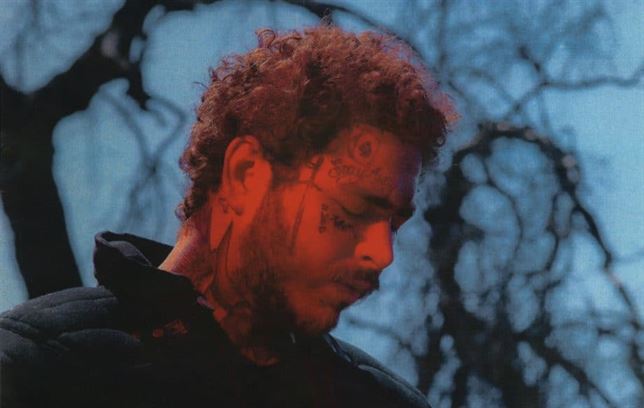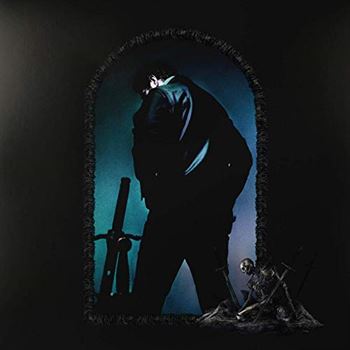Due to poor vocals, an abundance of features that afford the project very little chemistry and a hodgepodge of varying genres that don’t blend together, rapper/singer Post Malone’s new album “Hollywood’s Bleeding” ends up sounding messy and confusing.
“Hollywood’s Bleeding” is Post Malone’s third studio album, after his debut album “Stoney” in 2016 and his sophomore effort “Beerbongs & Bentleys” released in April of last year. The Texas rapper first came to prominence in 2015, with his breakout single “White Iverson.” Since then, Malone has managed to assert himself as one of the most successful and talked about musicians in contemporary music.
Malone likes to pride himself on being a “modern rockstar,” often striving to combine hip-hop and rock-and-roll influences in his music. He continues these efforts on his new album, with the addition of other genres. However, these attempts prove to be futile, as he fails to achieve any sort of balance or harmony amongst these distinct music styles.

The album features many guest artists from a variety of genres, such as Future, SZA and Ozzy Osbourne.
Photo courtesy of Republic Records.
The tracks in which Malone attempts to combine differing genres sound muddled, especially the track “Allergic,” which is one of the worst songs on the entire album. The fast-paced verses offer vocals from Malone screeching the name of the song over and over again. The song slows down as it approaches the chorus, in which it audibly becomes more pop influenced, and is reminiscent of Elton John’s “Crocodile Rock.”
Don’t get me wrong, I enjoy a good Elton John song as much as the next guy, but it doesn’t work in tandem with Malone’s loud, distorted vocals, which confuses the overall tone of the song.
The song “Take What You Want” also suffers from this same issue. The track features vocals from both Travis Scott and legendary heavy metal singer Ozzy Osbourne, of Black Sabbath fame. Osbourne’s vocals on the chorus are as strong as ever, but his contribution feels somewhat out of place on the track, as if it were just thrown into the song along with Scott’s autotuned rap verses.
This pattern of poor chemistry between Malone and his featured artists is apparent on other songs as well. The track “Die For Me” features rapper Future and pop singer Halsey. Both artists make completely different contributions to the song that results in it sounding cluttered. Although the upbeat, bouncy “Enemies” features a solid verse from DaBaby, it doesn’t flow all that well with Malone’s verse and chorus.
“Sunflower” is a rare highlight, as Malone seems to greatly benefit from featured vocals by Swae Lee. However, this track, which was featured in the hit animated film “Spiderman: Into the Spiderverse,” seems out of place, as if it was put on the album purely for its chart success after the film’s release.
“Goodbyes” is a solid track with a decent verse from featured artist Young Thug, except that it literally falls short at only two minutes and 56 seconds.
Leaving listeners wanting more is an issue throughout the album. 10 out of the 17 tracks are under three minutes long, which is too little time to convey any sort of complete idea. The last seven tracks are far too short and seem somewhat empty and incomplete, especially the song “Internet.”

Post Malone has risen on the pop/hip-hop charts since his debut single “White Iverson” gained traction in 2015.
Photo courtesy of Republic Records.
On the track, Malone sings about his concerns with the internet and social media culture, and the song ends with a beautiful orchestral piece that builds to a powerful crescendo. Unfortunately, this leads the listener to think that Malone has something else to offer, but much to the listener’s dissatisfaction, the track suddenly ends. The song could have been better if Malone had expanded upon the idea and committed to a full-length track.
“Hollywood’s Bleeding” suffers from poor vocal performances on the part of Malone himself. More often than not, Malone voice sounds sort of strained, like he isn’t reaching his full potential. He doesn’t quite reach the notes and pitches that he wants to, and it shows. They’re not the worst vocals I’ve ever heard, but it is enough to tire me out as a listener.
The album’s tenth track, “I’m Gonna Be,” is a prime example of these fatigue-inducing vocals. Malone sounds like he’s singing too high for his own voice at the start of the chorus, and it only gets worse when he screeches the sentence, “Can you feel it,” multiple times. It’s extremely painful to listen to, and I can only imagine the pain the staff in the studio endured while listening to Malone record the track.
Post Malone’s “Hollywood’s Bleeding” sees the rapper far from his best, with poor choices and performances coming from different directions resulting in an overall poor album. Hopefully the future holds better projects to come from the young artist, but for now Malone can use this project only as a learning experience.



